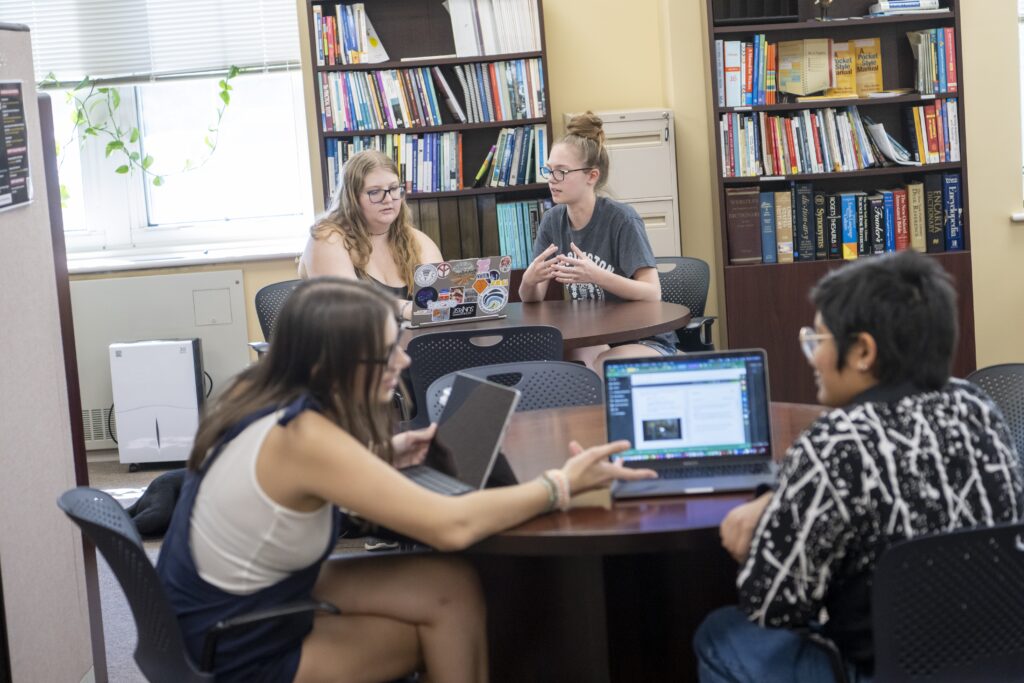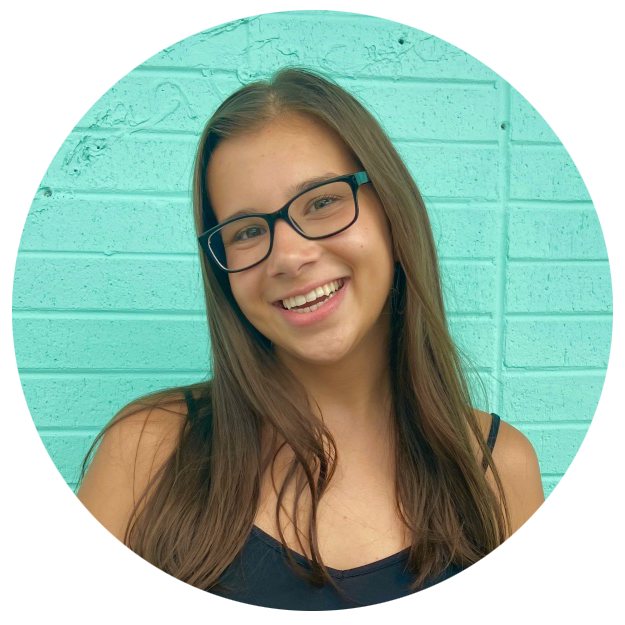A conversation with Grace Apostol, Miranda Parrish, and Rachel Rodriguez, Washington College
How do writing tutors navigate difficult conversations in the course of their work with peers, moments where student writers share vulnerabilities or tutors feel the heavy weight of imposter syndrome? Washington College writing center director Rachel Rodriguez facilitates a conversation with two undergraduate writing tutors, Grace Apostol and Miranda Parrish, about how they grapple with these scenarios and translate their training into the reality of their praxis.
Rachel: Grace, Miranda, thanks for joining me today to talk about difficult conversations you’ve experienced in your work as a writing tutor. Both of you are finishing up your first year of tutoring. Can either of you recount any deeply personal sessions you’ve had so far?
Miranda: I had a session at the beginning of this year with a freshman taking a first-year seminar about social issues. She was writing about racial justice, specifically in the criminal justice system. She wanted to have two interviews, one within the incarcerated community, and one outside of it. She started talking about how her brother was currently in prison and how he was getting out in a week, and here she was trying to narrow down this topic. She wondered about including her brother. That moment was really important to me, as I realized that not all reflective writing is about things that happened years and years ago. Sometimes we write to process things happening in the present day. The idea that she might interview her brother getting out of prison that week, and then write about it, it felt really real, you know, this was actually happening in her life. As a tutor, I had to adopt a different sensitivity than if it had been a memory from long ago; that kind of memory is different because it’s selective. But this was happening to her right now, and her thoughts were very vivid, and that was eye-opening for me. Navigating that session was very new, and I was worried, because I didn’t want to come off in a close-minded way, or imply the writing center isn’t a welcoming place. But we’re friends now, probably based on how that first session went.

Rachel: Did you know before the writer came in that she was going to talk about her brother, like, was it indicated in the appointment form? Or did it unfold as the session was happening?
Miranda: It happened while we were talking. Our session was about narrowing her topic and brainstorming with me. She had these ideas for broad social issues within the Black community; she was a Black student. And the prompt asked her to connect the broader issues to the actual prison community. Initially, I was thinking of the Kent County newspaper or finding memoirs, and that’s when she started talking about her brother. Her connection to the community was personal. And that personal connection would make her writing so impactful.
Rachel: How did you navigate those moments when she was talking about her brother? What kinds of tools did you use to support her in that moment?
Miranda: Actually I kind of take a pause, and let the writer fill in that time with their words and thoughts, because they’re trying to fill that silence. That way, I take direction from her. So this writer did talk more as I got quieter, and that’s when she said she was really excited about her brother’s release. She put a positive light on it, which was helpful for me. She shared a piece of herself, and I was really receptive. And so the silence may have been initially uncomfortable for her, but it helped me learn more information about the situation without having to ask questions that may have directed the conversation too much. I remember thanking her for sharing, and saying that her brother was a fantastic resource for this assignment, if that was something she felt comfortable sharing.
Rachel: That’s a great suggestion, to take a moment, because your initial reaction might’ve been to say you’re so sorry for her situation. But letting her fill that pause with excitement really informed you about her mindset. She wasn’t focused on why her brother went to prison; she was focused on what’s happening right now, his anticipated release. In that way, you could support what she was feeling in the moment. Grace, do you have any similar kinds of stories?

Grace: I have two. One was with a freshman and the other was with a senior, but they were very similar. With the freshman, I tutored her a couple of times before we built a good rapport. She came to me for an intro class she was taking. She didn’t attach the work beforehand, so I didn’t really have much to gauge from, but it was essentially a creative piece about her experience as a Black woman. When she started reading it aloud, as someone who is a white woman, I couldn’t relate to the experiences that she had gone through, nor would I ever try to, but as a writing tutor I tried to focus on helping her convey what she wanted to convey. In a creative piece like that, where you’re writing about your experience, who am I to try to change your writing? The second session was a similar situation. This time the writer was a senior who booked an appointment with me to talk about a piece for her Sophie Kerr portfolio [the Sophie Kerr Prize, awarded to a student of Washington College, is the largest national literary prize in the United States]. The writer was Asian, and in the piece she talked about violence against Asians during the pandemic. Again, it was something that I would never try to relate to. I can’t ever understand the pain that she or that freshman have gone through simply because of their race. In this session too, we just tried working together through what she was trying to convey. I asked her questions about the feelings she was trying to bring out in the reader. I told her about the feelings it ignited in me, and we tried to match that to her intentions. It wasn’t so much about trying to match up my experiences with those two tutees, because I could never. But that’s not the point of a session. It’s more about asking yourself, “how can I be respectful in this moment?”
Rachel: What do you think that this strategy of acknowledging difference does? Do you think if you had tried to relate to their experience, or talk about your own experiences with hatred, that it might have undermined or derailed the session?
Grace: I think you can’t erase the differences between you and a tutee by bringing up your own experiences, so you shouldn’t try. When a writer comes to me and wants to talk about their experiences of hatred as someone who is Asian or Black, I would never say, “well, I’m disabled and I’ve experienced hatred in this way.” There’s hate at all levels, and there’s hate of all types, and I think trying to compare and contrast with a writer is not going to get you anywhere in an appointment. That’s not empathetic, that’s showing that you don’t know how to deal with these difficult conversations. And I think if you’re comparing in order to center your own feelings, then the writer is going to shut down and they’re not going to want to be in that place of vulnerability with you again. They know, just as well as you do, that you can’t relate to their specific experience. But they’re expecting you to respect that and to approach the session as a professional and as a reader with fresh eyes. Don’t try to tutor them in something that you know nothing about. Because that’s not what a tutor does.

Rachel: When you’re in the midst of a session that’s gotten really personal, how do you adjust your tutoring practice to keep that student going and encourage them?
Miranda: I think it’s important to position yourself with open body language to show that you care, and also verbally stating that this is a safe space and I won’t judge you. I’m here to help you, instead of hinder you. This helps show that the writing center is a place on campus where you can show who you really are. Writing is a very personal and personable activity, and being a tutor can really reinforce that in someone’s mind or really hurt someone who may not feel that comfortable or confident in their writing.
Grace: See, for me body language is a little different. I guess because of Covid, I kind of forgot how much your body language can matter to others, and I’m not a big reader of body language. I’m not someone who’s very big on personal touch, so I tend to keep myself closed off somewhat, totally unintentionally. Since I know this about myself, I try to keep my tone light to compensate and ask multiple times in a session, ‘am I making sense?’. I think that question kind of reaffirms that we are here to have a conversation and my words aren’t the be all and end all; no one is the master of writing and we all write differently.
Rachel: Both of you mention moments where a writer may be feeling vulnerable. What do you do with moments like this in a session?
Grace: I think it’s important to realize that when a writer is being vulnerable with you in a session, they’re not just being vulnerable with you alone. They’re in the process of submitting this assignment for a class, or for a portfolio, or for some prize. So positive reinforcement is so necessary, because unlike an academic paper where maybe you’re helping with format or citations, when a writer is working on a personal creative piece, there is this level of vulnerability that they’re opening themselves up for critique, and that’s scary. I commend them for that. I don’t say, ‘yes, you are writing in the way that you should be writing about your oppression.’ It’s rather, ‘you should be proud of yourself, because when you were given hatred, you didn’t shut down.’ The beauty of writing is that it can convey that vulnerability. And I saw that in those two sessions I talked about. It’s very courageous of both of them to put this out into the world, and I make it clear that they can also take it back if they need to. It’s no one’s experience but theirs, and they’re the only one who can write it the way they did. That’s important to reiterate to any student, regardless of what they’re writing.

Miranda: I take a backseat and let the writer lead the session. While they came to you initially for help, it has to be a balance between the tutor offering suggestions and the writer asking for help. Each session is different. When a student is feeling weary about a personal piece of work and doesn’t know what or where to look at during the session, I ask if there are areas where the student doesn’t feel like their ideas are conveyed in the ways that they intend. This question usually opens us up to look both at big sections but also minor alterations, such as rewording sentences.
Rachel: We’ve talked a lot about writers feeling vulnerable, and I wanted to end by asking, what about when tutors feel vulnerable, or unprepared to handle personal or emotional moments with writers?
Grace: Something we talked about in EDU406 [the tutor training course at Washington College] that really resonated with me was imposter syndrome, specifically how it affects young women, so even now, a year after I took EDU406, when I’m talking to tutor trainees in the class now, they’re saying things like “I’m not sure I’m ready for this job,” and I can see that as imposter syndrome. You are where you are because someone saw potential in you. We’re exceptionally hard on ourselves. It comes full circle in our work in the center—students come into the writing center beating themselves up, and now we’re the ones coaching them through that same imposter syndrome we felt.

Miranda: The thing that stood out to me the most from EDU406 was how we were taught to view differences and acknowledge them, not just read about them but reflect on them. Sometimes my political sciences classes focus so much on statistics and group trends, so it was great that in EDU406 we focused on acknowledging and uplifting each individual. We’re not only tutors but students too, we’re a friend and a peer so we can truly understand what writers are going through.
For more on social justice and helping writers navigate sensitive materials when emotions are high, see Suhr-Sytsma and Brown’s 2011 article “Theory In/To Practice: Addressing the Everyday Language of Oppression in the Writing Center” in the Writing Center Journal. Grace spoke more extensively in our interview about disability and disclosure; for more, see Babcock and Daniels’ 2017 edited collection Writing Centers and Disability.

Grace Apostol is an English major minoring in Theater, Journalism, and Communication. She is a news co-editor for the Washington College newspaper The Elm, a member of the acapella group Wacapella, and the ADA chair of the Student Government Association. Grace has been a writing tutor since 2022.

Miranda Parrish is a double major in Political Science and Communication. She is also the Student Government Association President, a member of the Black Student Union, and has worked as a writing tutor since 2022. Miranda hopes to one day become the President of the United States.

Rachel Rodriguez has directed the Washington College Writing Center since 2021. Her PhD is in Rhetoric and Composition from the University of Louisville. Her research and teaching interests include composition pedagogy, writing centers, translingualism, and basic writing. She has published in Teaching English in the Two-Year College, George Eliot-George Henry Lewes Studies, and WPA-CompPile.

